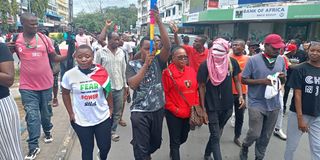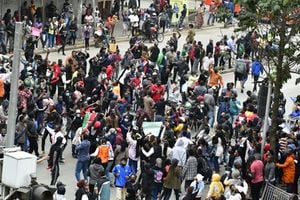Anti-government protests stifling healthcare: Study

The survey showed that in some areas, ambulances have faced delays or have been unable to operate due to the protests.
What you need to know:
- In Mombasa, a healthcare worker reported that the hospital is normally closed during the fracas because Bamburi is considered a violence hotspot.
- In any country, access to healthcare becomes a major problem during crises, especially for women, children, and the elderly.
Seven out of 10 hospitals in 43 counties registered a decline in the number of patients seeking services owing to transport disruptions due to the anti-government protests. A study by Reproductive Health Network-Kenya (RHN-K) this month, which covered 214 healthcare facilities, revealed that 72 percent of those surveyed reported that fewer patients sought services.
In the survey, sixty-nine percent of healthcare workers said that security concerns and closure of hospitals disrupted their work schedules.
At least 28 percent of health facilities experienced incidents of vandalism, harassment by law enforcers and they also attended to emergency casualties. The survey also indicated that the unrest delayed treatment for patients with chronic conditions due to safety concerns and transportation disruptions. People were hesitant to travel during times of unrest.
Outpatient services, special clinics for chronic diseases, maternity and children clinics, family planning and sexual reproductive health services were the most affected.
The survey showed that in some areas, ambulances have faced delays or have been unable to operate due to the protests.
The survey administered 17 open-ended questions to offer a rapid assessment of the impact of protests on sexual reproductive health (SRH) and rights. It revealed that 12 percent of facilities have noted a trend change in SRH services, including increased demand for condoms and self-injectable contraception as well as a rise in sexual gender-based violence cases.
From the findings, 25 percent of facilities reported that they experienced shortages of condoms, emergency pills and self-injectables. Sixty percent of the facilities report to have had their working hours affected and 40 percent stated that they were not affected by the protests.
“When the demonstrations begin around 11am on Tuesdays and Thursdays, I do not receive any clients even if they had an appointment. Most people, and possible customers keep away from town. The people who have shops in town close them and stay at home. My clinic is located in town,” one healthcare worker said in the report.
Another said that the clinic where she works in is situated on my main road to the Sirare border and the road is always barricaded by the protesters just 50 metres from the facility, and so access becomes impossible. “When the road is barricaded, it’s very difficult even for us healthcare workers to leave the hospital. Teargas is thrown even inside the hospital. For our safety and that of our clients, we remain closed,” she said
In Mombasa, a healthcare worker reported that the hospital is normally closed during the fracas because Bamburi is considered a violence hotspot. In any country, access to healthcare becomes a major problem during crises, especially for women, children, and the elderly.
Ms Nelly Munyasia, the Executive Director of RHN-K, said the study came about after concerns were raised.
“We were informed by our healthcare providers about the situation on the ground, and we wanted to understand the impact of the protest,” she says. “We were thinking of pregnant mothers who were due for their clinic visits on the said days, family planning refills, and many other people who are not getting healthcare services. What is the impact of not getting services when they need them? How do we ensure, as a country, that we do not start recording mortalities as a result of the political protests?” She said.
Some 30 percent health facilities reported destruction and vandalism while 70 percent said that they had not experienced any threat during the periods of unrest. “Some demonstrators entered health facilities while fleeing and the police fired teargas. Some protesters stoned some health facilities,” stated the survey.
On the question of whether there is a change in the number of patients seeking healthcare services due to the political protests, 72 per cent are reporting a decrease, while 28 per cent are reporting no change. The survey recommends the provision of security by law enforcement agencies to private and public facilities and awareness to the public on essential services which are not supposed to be disrupted.
Prof Shem Otoi Sam, an expert in infectious disease modelling, said critically ill patients are a cause for worry.
“My concern is for patients with chronic diseases. When they miss their clinic appointments, the likelihood of disease progression is very high,” he said. “The moment they miss their clinic days, it means severe complications, requiring more intensive and expensive medical interventions later on. We need to ensure that hospitals operate normally, with no one, including mothers and children, missing their prenatal care and vaccinations. Let’s make sure that we, as a country, do not get ourselves into bigger problems,” he added.




